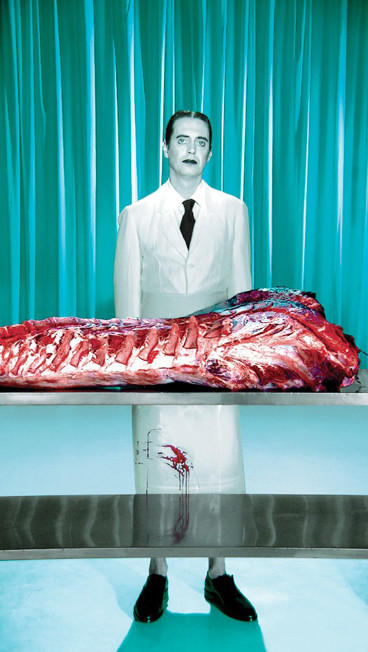Robert Wilson "Video Portraits"
30 Jan - 27 Mar 2010

Steve Buscemi, 2004
65" Plasma Screen, Custom Speaker, HD Media Player
66” (H) x 36” (W)
Courtesy: Robert Wilson and Galerie Thomas Schulte, Berlin
Produced by Dissident Industries Inc.
65" Plasma Screen, Custom Speaker, HD Media Player
66” (H) x 36” (W)
Courtesy: Robert Wilson and Galerie Thomas Schulte, Berlin
Produced by Dissident Industries Inc.
On Friday, 29th of January 2010 from 7 to 9 pm, Galerie Thomas Schulte will be presenting a selection of Robert Wilson’s Video Portraits, a project the director, stage designer, author, actor, and artist has been working on for more than five years. Parallel to the exhibition at the gallery a further selection of Video Portraits will be shown at the Kunsthalle Koidl in Berlin Charlottenburg (February 9 – May 2, 2010).
During the last five years, Robert Wilson (born 1941 in Waco, Texas) developed over 150 Video Portraits, in which international personalities from film, theater and opera, as well as animals and ordinary people are captured in empathetic poses.
A generous selection of Video Portraits, previously shown in numerous international museums, has most recently been exhibited in Hamburg at the Sammlung Falckenberg and at the Hamburger Kunsthalle. Furthermore, from the middle of May this year, the works will also be shown at the ZKM in Karlsruhe. The Galerie Thomas Schulte has composed a concentrated assortment of works that pin-points the virtuosity with which Wilson transcribes his complex and aesthetic use of theater’s language, imagery and sound into portraiture.
Like the theater, Video Portraits are the realization of a surreal dream, in which nothing defines a tangible space and everything is a sculpture: the few objects and props, as well as the flamboyantly dressed figures, move pantomimically in slow-motion, often attempting only slight movements that become isolated and preserved through light and shadow. Separated from the figures, music, or often times irritating sounds or voices emanate from the screens, creating an additional acoustic realm, and making the portraits appear strangely unconscious.
Wilson’s Video Portraits are cinematic transformations of his theater work, embodying a tradition of Abstraction, Minimalism and Deconstruction. In this respect the artist and architect contrives his portraits in the spirit of structure. This means that the artist operates in a series of respective steps, identifying the time first, then the setting and lighting, the plot, and finally the sound and text.
Hereby text, image, plot, and sound become isolated elements, parallel incidents, which appear to have nothing in common and still strengthen each other’s effect. As usual, Wilson’s work concentrates on the image rather than its message. Wilson lets the work’s own poetry unfold by leaving them free of insinuation and interpretation, aiming to give the viewer the freedom to delve into the work with no outer influence.
During the last five years, Robert Wilson (born 1941 in Waco, Texas) developed over 150 Video Portraits, in which international personalities from film, theater and opera, as well as animals and ordinary people are captured in empathetic poses.
A generous selection of Video Portraits, previously shown in numerous international museums, has most recently been exhibited in Hamburg at the Sammlung Falckenberg and at the Hamburger Kunsthalle. Furthermore, from the middle of May this year, the works will also be shown at the ZKM in Karlsruhe. The Galerie Thomas Schulte has composed a concentrated assortment of works that pin-points the virtuosity with which Wilson transcribes his complex and aesthetic use of theater’s language, imagery and sound into portraiture.
Like the theater, Video Portraits are the realization of a surreal dream, in which nothing defines a tangible space and everything is a sculpture: the few objects and props, as well as the flamboyantly dressed figures, move pantomimically in slow-motion, often attempting only slight movements that become isolated and preserved through light and shadow. Separated from the figures, music, or often times irritating sounds or voices emanate from the screens, creating an additional acoustic realm, and making the portraits appear strangely unconscious.
Wilson’s Video Portraits are cinematic transformations of his theater work, embodying a tradition of Abstraction, Minimalism and Deconstruction. In this respect the artist and architect contrives his portraits in the spirit of structure. This means that the artist operates in a series of respective steps, identifying the time first, then the setting and lighting, the plot, and finally the sound and text.
Hereby text, image, plot, and sound become isolated elements, parallel incidents, which appear to have nothing in common and still strengthen each other’s effect. As usual, Wilson’s work concentrates on the image rather than its message. Wilson lets the work’s own poetry unfold by leaving them free of insinuation and interpretation, aiming to give the viewer the freedom to delve into the work with no outer influence.
